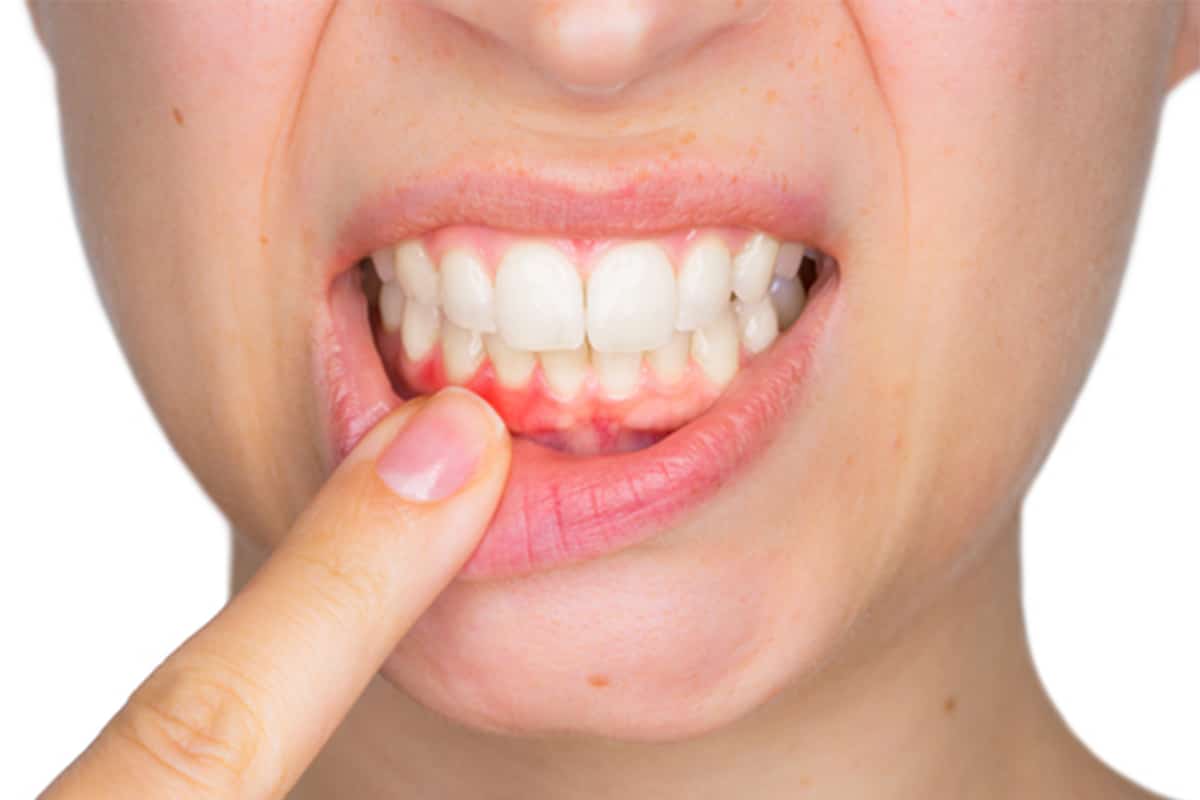
Gum disease, also known as periodontal disease, is an infection that affects the structures of the teeth and gums. It is caused by a buildup of plaque and bacteria in the mouth. If left untreated, gum disease can lead to severely swollen gums, tooth loss and other oral health problems.
The earliest stage of gum disease is called gingivitis. This occurs when plaque accumulates on the teeth and gums, causing redness and swelling in the area. In this stage, you can reverse or halt progression by brushing your teeth twice daily with fluoride-containing toothpaste and flossing at least once a day.
If left unchecked, gingivitis will turn into periodontitis—a more serious form of gum disease. In this stage, bacteria under the gum line cause inflammation and infection that can damage the jawbone and supporting tissues that hold your teeth in place. You may experience permanent tooth loss if this condition is not treated promptly with professional dental care.
Signs of gum disease include red or swollen gums, tenderness or bleeding during brushing, receding gums, bad breath, loose or shifting teeth, changes in bite alignment, pus around the teeth and gums, or changes in how dentures fit. If you are experiencing these symptoms, you should see a periodontist for diagnosis and treatment right away.
You can prevent gum disease through proper oral hygiene habits such as brushing twice daily with fluoride-containing toothpaste, flossing at least once per day, using an antiseptic mouthwash regularly, eating a balanced diet low in sugar, avoiding tobacco products, and visiting your dentist for regular checkups every six months. Taking these steps will help keep your smile healthy for life!
Types and Symptoms of Gum Disease
Gum disease is an infection of the gums and soft tissues surrounding the teeth that, if left untreated, can lead to tooth loss, bone loss, and other serious medical issues. There are two main types of gum disease: gingivitis and periodontitis.
Gingivitis is a mild form of gum disease caused by a buildup of plaque on the teeth. It is characterized by red or swollen gums that often bleed when brushing, bad breath, and a metallic taste in the mouth. If not treated promptly, it can lead to periodontitis.
Periodontitis is a more severe form of gum disease in which bacteria under the gum line cause inflammation and infection, leading to damage to the jawbone and supporting tissues that hold your teeth in place. Symptoms may include receding gums, loose or crooked teeth, persistent bad breath or bad taste in the mouth, pain when chewing or biting down on food, bleeding from gums when brushing or flossing, pus around teeth and gums, changes in bite alignment (e.g., overbite), or shifting of teeth from their original position.
The long-term effects of gum disease can be far-reaching. Research has linked it to increased risk for cardiovascular diseases as well as other chronic illnesses like diabetes. It’s therefore important to get regular dental checkups with professional dental care providers every 6 months so they can diagnose any early signs of gum disease before it becomes more serious. With proper oral hygiene habits such as brushing twice daily with fluoride-containing toothpaste, flossing once per day, using an antiseptic mouthwash regularly, eating a balanced diet low in sugar, and avoiding tobacco products, we can help keep your smile healthy for life!

Causes and Risk Factors
Poor Oral Hygiene Habits
Poor oral hygiene habits allow bacteria to build up on the teeth and gums, leading to tooth decay and bacterial infection and contributing to the development of gum disease. You must keep up with are essential so your mouth remains free of plaque and tartar buildup that can cause gum disease.
Without proper care, you are at an increased risk for developing gum disease as well as other health issues such as heart disease or stroke. This is why it’s you should visit your oral health professionals regularly for checkups and cleanings. During these visits, a dentist or hygienist can identify any early signs of gum disease before it becomes more serious.
To reduce the risk of developing gum disease, you should practice good oral hygiene habits such as brushing twice daily with fluoride-containing toothpaste, flossing once per day, using an antiseptic mouthwash regularly, eating a balanced diet low in sugar, and avoiding tobacco products. Taking care of your teeth will help keep your smile healthy for life!
Genetics and Age
Genetics and age are two major factors that influence the health of your gums. People with a family history of gum disease may be more likely to develop it themselves, as genetics can play a role in the severity of the condition. In addition, risk factors increase with age, as your body becomes less able to fight off infection and repair damage caused by gum disease.
Older individuals should pay special attention to their oral care routine to reduce the risk of developing gum disease. This includes brushing twice daily with fluoride-containing toothpaste, flossing once per day, using an antiseptic mouthwash regularly, eating a balanced diet low in sugar, and avoiding tobacco products. Regular dental checkups are also important for catching any early signs or symptoms of gum disease before it becomes more serious.
Gum disease can lead to serious complications such as loss of tissue and bone support around teeth, which can eventually cause tooth loss. It has even been linked to increased risk for cardiovascular diseases and other chronic illnesses like diabetes. Individuals must practice good oral hygiene habits and visit their dentists regularly for checkups to maintain a healthy mouth for life!
Systemic Health Conditions
Systemic diseases can be a cause and risk factor for gum disease. People with uncontrolled diabetes, for example, are at an increased risk due to higher blood sugar levels, which can contribute to a buildup of bacteria in the mouth. This bacteria can cause an infection that leads to gum disease. Furthermore, people with weakened immune systems due to HIV/AIDS or chemotherapy may also be more prone to developing gum disease as their bodies can’t fight off infections as effectively as healthy individuals. Additionally, those who have had a recent heart attack or stroke may have an increased risk of developing gum disease because they are more likely to have poor oral hygiene habits and/or not receive regular dental care.
To reduce the risk of developing gum disease due to systemic health conditions, individuals should practice good oral hygiene habits such as brushing twice daily with fluoride-containing toothpaste, flossing once per day, using an antiseptic mouthwash regularly, eating a balanced diet low in sugar, and avoiding tobacco products. Additionally, individuals should get regular checkups with professional dental care providers every 6 months so they can diagnose any early signs of gum disease before it becomes more serious. At these appointments, our experienced team of dentists and hygienists will your gums and help keep your smile healthy for life!
Smoking and Tobacco Use
Smoking and tobacco use are major risk factors for developing gum disease. The toxins in these products can damage the soft tissue in the mouth, leading to inflammation and infection of the gums. This damage can result in loose teeth, gum infection, oral bacteria buildup, and eventual receding gums. Additionally, smoking can weaken the body’s immune system, which makes it more difficult for it to fight off infections caused by gum disease.
To reduce the risk of developing gum disease due to smoking or tobacco use, individuals should abstain from using these products. Additionally, those who do use them should practice good oral hygiene habits such as brushing twice daily with fluoride-containing toothpaste, flossing once per day, using an antiseptic mouthwash regularly, eating a balanced diet low in sugar, and avoiding other tobacco products like chewing tobacco. Additionally, regular dental checkups will help catch any early signs or symptoms of gum disease before it becomes more serious.
At these appointments, our experienced team of periodontists can provide you with a thorough cleaning that will help keep your smile healthy for life!
Malnutrition and Poor Diet
Malnutrition and poor diet can be a cause and risk factor for developing gum disease. Nutrient deficiencies can lead to weakened gums, which are more prone to infection. Poor nutrition also affects the body’s ability to fight off infections caused by bacteria in the mouth. Additionally, a lack of proper nutrition can cause soft tissue damage, leading to sensitive teeth and an increased risk for tooth loss due to weak connective tissue support around teeth.
To reduce the risk of developing gum disease due to malnutrition or poor diet, individuals should eat a balanced diet that includes plenty of fruits and vegetables as well as lean proteins. Additionally, individuals should practice good oral hygiene habits such as brushing twice daily with fluoride-containing toothpaste, flossing once per day, and using an antiseptic mouthwash regularly. Regular dental checkups will help catch any early signs or symptoms of gum disease before it becomes more serious. At these appointments, our experienced team of periodontists can measure the depth of pockets surrounding your teeth, provide you with a thorough cleaning that may help prevent deep pockets from forming in the future, and help keep your smile healthy for life!
Diagnosing Gum Disease
Diagnosing gum disease can be challenging for many dentists and periodontists. To accurately diagnose the condition, the provider will assess the health of the tooth root, gum tissue, and surrounding bone structure. During a dental exam, your dentist or periodontist will use X-rays to take detailed images of your mouth to identify any signs of infection or deterioration. The doctor may also measure the depth of pockets around each tooth, which can indicate how advanced the gum disease is. Additionally, they may take samples of plaque and tartar from the affected area to determine if bacteria are present that could be causing the infection.

Treatments for Gum Disease
Once the provider has diagnosed gum disease, the patient will have several treatment options available, depending on its severity. For mild cases of gingivitis, the patient may only need professional cleaning to reverse damage caused by bacteria and remove any buildup of plaque or tartar. In more severe cases with significant inflammation, the provider may prescribe antibiotics or other medications to reduce swelling and fight off infection-causing bacteria. For advanced cases involving deep pockets between teeth or bone loss due to receding gums, the patient may need surgical procedures such as pocket reduction surgery to restore oral health and prevent further damage.
No matter what stage of gum disease you are currently in, our experienced team can help you find an effective treatment plan that meets your needs. We understand how intimidating it can feel when faced with a diagnosis like this, but you can enjoy a healthy smile for years to come with our help!
Professional Cleanings and Home Care
To effectively treat and prevent gum disease, a combination of and home care is essential. During the treatment a dental professional will remove plaque, tartar, and any other debris. This type of cleaning helps reduce inflammation in the gums and helps the dental professional identify any potential issues before they become worse.
For home care, patients must practice good oral hygiene habits daily. Brushing twice per day with fluoride toothpaste, flossing once per day, and using an antiseptic mouthwash can help keep your mouth healthy and free from bacteria that can cause periodontal disease. Additionally, visiting your dentist or periodontist regularly for checkups can also help identify any early signs of gum disease so that you can receive timely treatment before it progresses further.
Gum disease is a serious condition that requires extra care for adequate management. By following both your dental care routine at home as well as receiving regular professional care from your dentist or periodontist, your oral health will remain in optimal condition, and you’ll reduce your risk of developing more serious oral diseases such as periodontitis or tooth loss.
Get the Best Dental Treatments in Miami, FL
Periodontal diseases affect people of all ages. Like all other illnesses, early detection makes a big difference. Proper oral hygiene alone is not enough. It would be best if you visited the dentist regularly for routine checkups. Should you be diagnosed with any gum disease, John Paul Gallardo, DDS, is always ready to provide the gum treatment you need. Call 305-447-1447 today and schedule a consultation.